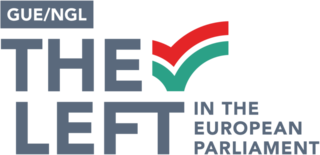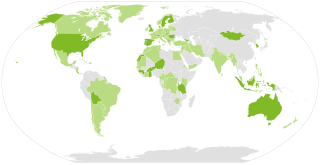
The Left in the European Parliament – GUE/NGL is a political group of the European Parliament established in 1995, and is composed of left-wing and far-left members. Before January 2021, it was named the European United Left/Nordic Green Left.

The Party of European Socialists (PES) is a social democratic European political party.
A communist party is a political party that seeks to realize the social and economic goals of communism. The term communist party was popularized by the title of The Manifesto of the Communist Party (1848) by Karl Marx and Friedrich Engels. As a vanguard party, the communist party guides the political education and development of the working class (proletariat). As the ruling party, the communist party exercises power through the dictatorship of the proletariat. Vladimir Lenin developed the idea of the communist party as the revolutionary vanguard, when social democracy in Imperial Russia was divided into ideologically opposed factions, the Bolshevik faction and the Menshevik faction. To be politically effective, Lenin proposed a small vanguard party managed with democratic centralism which allowed centralized command of a disciplined cadre of professional revolutionaries. Once the policy was agreed upon, realizing political goals required every Bolshevik's total commitment to the agreed-upon policy.

The Communist Party of Spain is a Marxist-Leninist party that, since 1986, has been part of the United Left coalition, which is part of Unidas Podemos.

The Socialist People's Party is a green, popular socialist political party in Denmark.

The Party of the Democratic Revolution is a social democratic political party in Mexico. The PRD originated from the Democratic Current, a political faction formed in 1986 from the Institutional Revolutionary Party (PRI). The PRD was formed after the contested general election in 1988, which the PRD's immediate predecessor, the National Democratic Front, believed was rigged by the PRI. This sparked a movement away from the PRI's authoritarian rule.

The Socialist Party of Chile is a centre-left political party. Its historic leader was President of Chile Salvador Allende, who was deposed in a coup d'état by General Augusto Pinochet in 1973. Twenty-seven years later, Ricardo Lagos Escobar represented the Socialist Party in the 1999–2000 Chilean presidential election. He won 48.0% in the first round of voting and was elected with 51.3% in the second round. In the 2001 Chilean parliamentary election, as part of the Coalition of Parties for Democracy, the party won 10 out of 117 seats in the Chamber of Deputies of Chile and 5 out of 38 elected seats in the Senate. After the 2005 Chilean parliamentary election, the party increased its seats to 15 and 8, respectively. In the 2009 Chilean parliamentary election, it retained 11 Congressional and 5 Senate seats.

The Galician Nationalist Bloc is a political alliance of left-wing Galician nationalist parties. It is self-defined as a "patriotic front".

The Communist Party of Chile is a Chilean political party. It was founded in 1912 as the Socialist Workers' Party and took its current name in 1922. The party established a youth wing, the Communist Youth of Chile, in 1932.
The World Union of National Socialists (WUNS) is an organisation founded in 1962 as an umbrella group for neo-Nazi organisations across the globe.
The Hostosian National Independence Movement is a leftist and pro-independence organization in Puerto Rico. As of 2015, Julio Muriente is known to be the leader.

General elections were held in Italy on 26 June 1983, to select the Ninth Republican Parliament. The Pentaparty formula, the governative alliance between five centrist parties, caused unexpected problems to Christian Democracy. The alliance was fixed and universal, extended both to the national government and to the local administrations. Considering that the election result did not longer depend by the strength of the DC, but by the strength of the entire Pentapartito, centrist electors began to look at the Christian Democratic vote as not necessary to prevent a Communist success. More, voting for one of the four minor parties of the alliance was seen as a form of moderate protest against the government without giving advantages to the PCI. Other minor effects of this election were a reduction of the referendarian Radical Party and the appearance of some regional forces.
In the context of Mexican politics, a national political association is a citizens' association intended to assist in the development of democratic life and the country's political culture, as well as being intended to create a better informed public opinion. They are similar to political parties; they used to receive public funding through the Federal Electoral Institute (IFE) for the promotion of their activities and ideas, but this was no longer the case after the 2008 political reform; after the 2014 political reform and the transformation of the IFE into INE, only political parties and independent candidates can receive public funding. APNs are not allowed to register candidates for election, though they can publicly support those of other political parties through association agreements and may only do so during federal elections. The creation of an APN is regarded as the first step towards the creation of a full-fledged political party.

The Red Party is a communist political party in Norway. It was founded in March 2007 by a merger of the Workers' Communist Party and the Red Electoral Alliance.
Advocacy groups, also known as special interest groups, use various forms of advocacy in order to influence public opinion and ultimately policy. They play an important role in the development of political and social systems.

The Progressive Alliance of Socialists and Democrats (S&D) is the political group in the European Parliament of the Party of European Socialists (PES). The Progressive Alliance of Socialists and Democrats was officially founded as a Socialist Group on 29 June 1953 which makes it the second oldest political group in the European Parliament after the Alliance of Liberals and Democrats for Europe group (ALDE). It adopted its present-day name on 23 June 2009. Centre-left in orientation, the group mostly comprises social-democratic parties and is affiliated with the Progressive Alliance and Socialist International.

The Progressive Alliance (PA) is a political international of social democratic, socialist, and progressive political parties and organisations founded on 22 May 2013 in Leipzig, Germany. The alliance was formed as an alternative to the existing Socialist International, of which many of its member parties are former or current members. The Progressive Alliance claims 140 participants from around the world.
A popular front is a broad coalition of different political groupings, usually made up of leftists and centrists. They are very broad and sometimes include centrist radical or liberal forces as well as social-democratic and communist groups. Popular fronts are larger in scope than united fronts.
Socialism in Italy is a political movement that developed during the Industrial Revolution over a course of 120 years, which came to a head during the Revolutions of 1848. At the beginning of the 20th century, there were a growing number of social changes. The outbreak of the First World War accelerated economic differentiation causing a wider wealth gap. This is seen as one of the key factors that triggered the emergence of Italian socialism.












